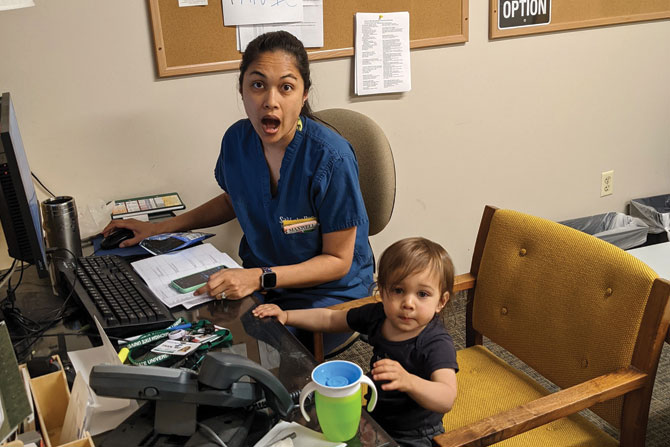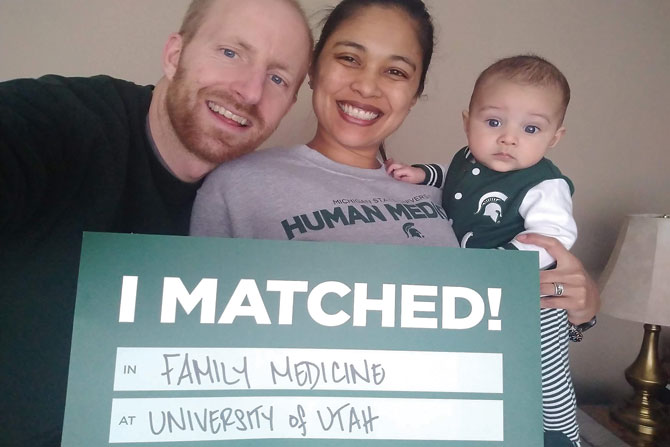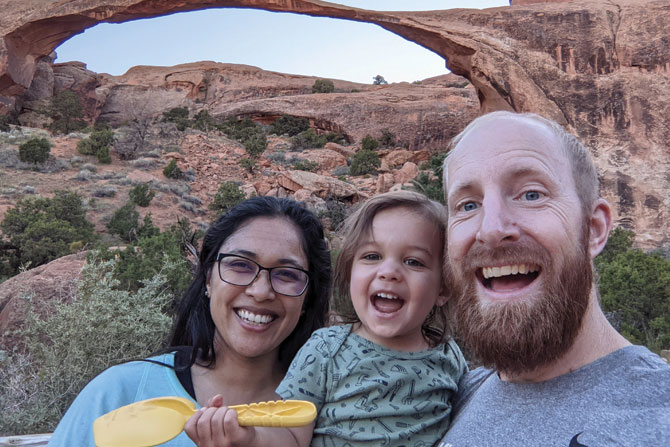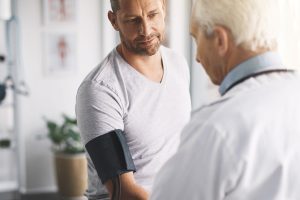The little bit of your story from the biography on the University of Utah family medicine residency site seems to only scratch the surface of what appears to be an amazing journey to medical school. Can you share a bit more of your story of that journey?
Oh man, My Story. It certainly has been long and convoluted. I grew up in low socio-economic and culturally diverse neighborhoods where English was spoken only by young children. I lived with my aunt in southern California for a few years as a baby until my mom could take me back to northern California, where I was born. We lived off food stamps and charity. My mom knew the tiniest bit of English; basically, she learned English with me once I started school. With her middle school education, she did her darndest to keep me ahead in math during elementary school and made me keep up my Vietnamese literacy. My brother (six years younger with a different dad) and I moved every year, around December/January, so I was perpetually the new kid in the middle of the year. I ended up going to four different high schools as well. Part of that was my own stupidity; I was a struggling teen, angry I had to straddle two cultures, so I rebelled. It didn’t help that I moved so often and didn’t have a stable support system. Not knowing me or my situation, the counselors often passed me over regarding wellness checks. I last lived with my mom when I was 14 and lived with other family members until I was 18. After high school, I somehow got accepted into a university. However, being the stupid teen I was, I allowed the acceptance to lapse and ended up going to a community college for the next few years. I struggled during that period, too, though I held several part-time jobs: at a restaurant, Big 5 Sporting Goods, Good Guys (an electronics store,) PetSmart, and Sears.
By the time I should have graduated from university, I became so mad at myself after four years of not completing anything. So I bribed myself: complete community college, and the end goal would allow me to go snowboarding all winter if I passed all my classes by the end of the year. I tried asking counselors at the community college for advice on redirecting my path to medical school, and I got a lot of, “maybe you should try for something easier.” For both mental and financial support, I asked to move back in with part of my family. (The group I had been living/hanging with the past few years was not supportive of my goals.)
The University of California San Diego finally accepted me. During my three years there, I became very involved with a volunteer clerkship program that provided pre-health students clinical exposure in what was basically a CNA-type role. I ended up as the assistant director of the ICU division, where I coordinated various ICU volunteers, the training I piloted, and acted as liaison between the program and the hospital directors and staff. That position ultimately morphed into many meetings and paperwork and less one-on-one interaction with patients that I craved. I loved teaching but missed patient care.

I slowly transitioned into being a private caregiver for various patients, who were sometimes difficult but also absolutely lovely. I had several traumatic brain injury (TBI) patients, some with different kinds of dementia, and some with multiple sclerosis (MS). I usually had one to two patients at a time. I supplemented that work with being a food delivery person and worked as a nanny and housekeeper. Those were some wild days and hectic schedules. I loved it.
I loved my patients but wanted to go to medical school and keep moving forward. I did not get any interviews the first time I inquired, so I applied for a postbaccalaureate to help “prove” I was ready for medical school. I busted my butt and made amazing friends at the University of California Davis’ postbaccalaureate program, geared toward pre-medical students from underserved and underrepresented groups.
My boyfriend (now husband) stayed in San Diego and a long-distance relationship was hard, but we video chatted every day before the pandemic made it a thing! After postbaccalaureate, I returned to San Diego and resumed the previous work schedule while applying to medical school. During the next cycle, I finally got in. OH NO, NOW WHAT DO I DO?-
I never envisioned anything beyond getting accepted; it had been my end goal for so long, but now I was a full decade older than most of my school peers. Yikes. But once again, I busted my butt. All credit goes to my now-husband who was all things a good partner should be: supportive, motivating, would not let me wallow too long in self-hatred, would not let me get lazy, made me put on real pants, made me coffee for all those exam days, and reminded me to talk about things other than school/medicine once in a while to make me feel like a person. And I did it – I completed medical school at Michigan State in Grand Rapids and made even more fantastic and lifelong friends. I also got married, and we started our family during this time.
Whew. Adulthood, here I am, I made it.

What are some factors that influenced your decision to become a doctor and pursue family medicine?
I was drawn to providing medical care as a kid because every human being at some point needs help, and one of the most basic ways to provide that help is through medical care. My disadvantaged upbringing and experiences as an adult give me a unique perspective and connection with my intended patient population. I felt the most significant impact I can make as a physician is with people who share the same roots.
When starting medical school, I still had a limited understanding of the various specialties. I knew that patients in underserved communities like mine often come to the emergency department (ED) as their source of primary care, so I looked first into emergency medicine and primary care. This quickly evolved into a strong passion for family medicine. The breadth of problems, age span, and the option of doing procedures appealed to my need for variety. It is essential to me that as a holistic-minded physician, I can address physical health along with emotional and mental health, particularly in underserved communities where it may be challenging to make it to even one appointment consistently. This also fosters a stronger longitudinal relationship with the patient, as my team and I would be their “home base,” whether or not they need additional specialists. As relationships grow, I have more opportunities to counsel, educate, and provide preventative care and health maintenance.
During clinical rotations, my favorite moments were spread out: the different outpatient clinics addressing prevention and chronic conditions counseling, complex cases in the operating room, completely unpredictable days in psych (where I worked with chronic mental health patients with schizophrenia and bipolar disorder), and the ever-changing ED. Luckily for me, family medicine is a specialty that allows me to continue to have all these different experiences (this is what I jokingly refer to as my “professional FOMO”).
What was it that drew you to apply for residency at the University of Utah? How has your experience been there?
I previously applied to medical school here, mainly because we love winter sports and have a few friends out here. I decided to check it out for residency as well for similar reasons. There were several things I was specifically looking for in a residency and a few things that surprised me about Utah. I definitely wanted a blend of academic and community medicine, strong relationships with other residencies in the area, and strong obstetrics. What I was also looking for but was pleasantly surprised by in Utah was so much diversity (way more than expected,) a large refugee population, and transgender health care. What ultimately tipped the scales was the resident relationships and focus on resident wellness. The residents genuinely seemed to like each other, had such amazing things to say about each other and the residents we interact with from other programs. This program had the best quality of life focus of all the residencies I was seriously considering. We were now a family of three, so I had to consider the quality of life for my family as well. While there are certainly days when I’m not loving being a resident, I am incredibly grateful to be here and absolutely feel like I made the right decision to come here.
In your biography on the University of Utah site, you also mention that your interest areas include education advocacy for disadvantaged youth and their parents, being a high school student medical interest mentor, and working with immigrant and other underserved populations. What does putting those interests into practice look like for you?
Yeah! I grew up in immigrant and low SES communities, so that’s always been “home” to me. I always participate in things geared toward disadvantaged families because I came from one, and I REALLY wish that I had crossed paths with more professionals growing up. My cousins and I are the first ones to finish high school and go to college. I’m the first one to receive an advanced degree, so there was no way to ask anyone in our family for any kind of guidance about school (other than “go to it!”).
Being from a low SES background and fighting that, and now having studied all about it, I understand and feel the struggle from many different angles. I try to reach out to families; the young kiddos to get them excited, the teens to try to bring them back from the dumb decisions they’re making, and parents to help educate and break the cycle. I’ve been the kid with food stamps, with thrift stores and knock-off clothes. I received corporal punishment for most of my childhood (mom is from the old country, which is how she was raised). I’ve briefly been in the foster system and fought viciously to stay with my baby brother every single minute. I’ve been the truant, smoked cigarettes for 14 years, and participated in over-drinking and illicit substances. But I also finally graduated not only from high school but college. And incredibly, also medical school – and I am now a doctor. It took me years, but I successfully quit smoking. I found an absolute saint, we got married, and now we have an almost 2-year-old who is way too smart for our sanity. Somehow along the way, I cut out all the deviant habits and behaviors and forced myself to evaluate what kind of person I wanted to be, with a lot of mental and emotional support from my brother and my husband. These are the stories and struggles that I can share with my mentees, peers, and patients. I think it’s important to know that you can keep trying, even if you’ve messed up over and over, and trying won’t always work but when it does it’s worth it.
The relationships with patients take time, but it’s so gratifying to follow someone over the years, be their medical advocate, and watch them progress in managing whatever conditions they struggle with. You also get to take a step back and look at the whole patient, rather than just one aspect of them, and you have an opportunity to help any human being.
If you talked to young adults considering medicine as a career, why would you tell them to consider family medicine?
The hugs. Just kidding, we live in COVID times. I love family medicine because there are so many ways for you to mold it to exactly what you love and help the patients for whom you feel the most passion. You can choose inpatient, outpatient, or a combo. You see every human in residency, but you can choose which population you want to work with afterward, whether you want to focus on geriatrics, women’s health, sports medicine, or a billion other directions. There are procedures you can do if you like that. And, you get to learn a bit of everything! The relationships with patients take time, but it’s so gratifying to follow someone over the years, be their medical advocate, and watch them progress in managing whatever conditions they struggle with. You also get to take a step back and look at the whole patient, rather than just one aspect of them, and you have an opportunity to help any human being.









